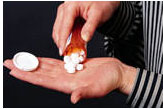Dietary Supplements can be
dangerous
(April 04, 2004)
WASHINGTON Despite known hazards, many potentially dangerous dietary
supplements are readily available for purchase in stores and on the
Internet, according to a new report from Consumer Reports. The magazine
released its "dirty dozen" list of dietary supplements that it says are too
dangerous to be on the market, reports Webmd.
The list includes yohimbe, bitter orange, chaparral, and andro. But
researchers say the supplements are sold under many names, which makes it
hard for consumers to know what they're getting. Many of the supplements
that made the list have already been
banned in other countries. But researchers say regulatory barriers created
by Congress have prevented the FDA from taking similar actions to protect consumers in this country.
taking similar actions to protect consumers in this country.
Researchers from the consumer magazine say the supplements that made its
"dirty dozen" list may cause cancer, severe liver or kidney damage, heart
problems, or even death.
For example, they say the herb aristolochia has been conclusively linked to
kidney failure and cancer in China, Europe, Japan, and the U.S. Yohimbe, a
supplement marketed as a sexual stimulant and herbal Viagra, has been linked
to heart and respiratory problems.
Many of these dietary supplements are sold in both single and combination
products marketed for a wide variety of uses, from building muscle and
losing weight to easing stress and arthritis.
Since the brand names of the products containing the dirty dozen supplement
ingredients vary widely, researchers say consumers should read ingredient
labels carefully and look for the following:
Aristolochic acid (Aristolochia, birthwort, snakeroot, snakeweed, snagree
root, sangrel, serpentary, wild ginger) have caused documented human
cancers, and it is linked to kidney failure.
Other ingredients that are harmful and lead to abnormal liver function are
comfrey (Symphytum officinale, ass ear, black root, blackwort, bruisewort,
consolidae radix, consound, gum plant, healing herb, knitback, knitbone,
salsify, slippery root, symphytum radix, wallwort.
While androstenedione (4-androstene-3, 17-dione, andro, androstene) lead to
increased cancer risks and decreases in "good" HDL cholesterol according to
the report.
Experts say it's important to tell your doctor about any dietary supplement
you may be taking. Not only do many supplements have significant side
effects, but they may also interfere with the effectiveness of prescribed
medications, such as birth control pills. (ANI)